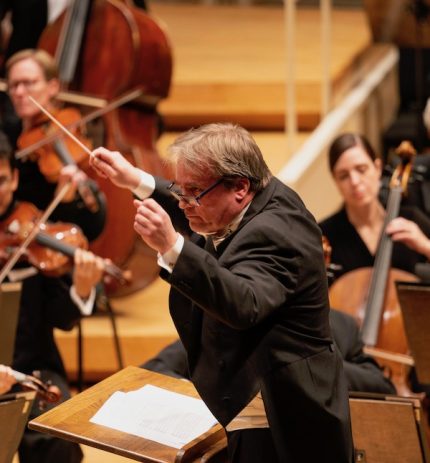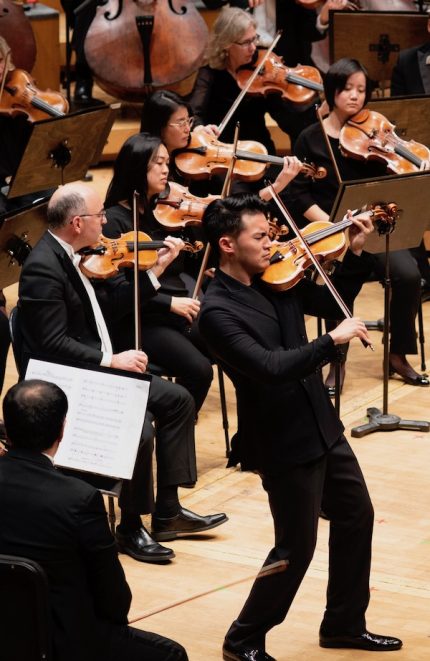Storgårds, CSO bring explosive urgency to a Tchaikovsky standard

John Storgårds returned to the Chicago Symphony Orchestra Thursday night, following his local podium bow two seasons ago. And while the program held interest for the Orchestra Hall debut of a fast-rising violinist and two works new to the CSO repertory, it was a tried-and-true Russian symphony that lifted the evening out of the ordinary.
Tchaikovsky’s three final symphonies are so familiar and played so often that it counts as a genuine feat to bring a fresh sense of discovery. But such was the case with the riveting performance of the Russian composer’s Fourth Symphony delivered by Storgårds and the orchestra Thursday night.
The Finnish conductor’s tempos hewed to the traditional side and he didn’t do anything particularly outré or take any unusual risks with Tchaikovsky’s fate-laden work. Yet from the malign, explosive blast of the brass motif in the opening bars, this was a Tchaikovsky Fourth that meant business.
There was striking tension and a coursing electricity throughout this performance. The stentorian main theme and dramatic outbursts of the opening movement were given at full throttle, the CSO brass sounding unleashed in a way they rarely do when their music director is in the house.
Yet the contrasting episodes were fresh and equally characterized, notably the lanquid winds painting the balletic melancholy of the Andantino. (Principal bassoonist Keith Buncke was at his considerable finest here and throughout.) The strings brought customary polish and bracing precision to the pizzicato Scherzo.
The performance was rounded off with a finale of remarkable power and intensity. Tchaikovsky described this movement as a kind of light-hearted country festival, a way for upper-class depressives like himself to be cheered by the simple pleasures of rustic bumpkins.
More effective are the performances that find a darker quality in the finale and such was surely the case here. Under Storgårds, the main theme went with a fury and unhinged desperation that was jarring but wholly apt in the context of the overall piece. There was little sunlight or optimism in the baleful return of the fate motif and frantic drive to the coda—thrilling and unsettling in equal parts, with whirlwind virtuosity from the strings and massive sonic punch from the brass.
The first half offered more mixed rewards with the subscription debut of a heavily marketed young virtuoso.
Along with Niccolò Paganini and Henri Vieuxtemps, Henryk Wieniawski was among the great double-threat violin virtuosos of the 19th century— musicians who also composed their own concertos as showpiece vehicles to awe audiences with flights of instrumental brilliance and derring-do.
The Polish composer wrote two concertos for his instrument. The Violin Concerto No. 1 in F sharp minor, composed in 1853, received its belated CSO premiere Thursday night, performed by Ray Chen.

A prodigy who performed at age eight at the opening ceremonies of the 1998 Winter Olympic in Japan, the 30-year-old Curtis alum won first prize in both the Menuhin and Queen Elisabeth competitions. His extensive program bio reflects the crossover marketing bait of Chen’s youthful good looks and flashy virtuosity: a high-profile recording contract with Sony, a multi-year partnership with Armani, guest appearances on Mozart in the Jungle, and writing “a lifestyle blog” for RCS Rizzoli.
All of which makes Ray Chen an ideal protagonist for Wieniawski’s tuneful but rather shallow fiddle showpiece. Performing on a 1715 Stradivarius owned by Joseph Joachim, the soloist tackled the myriad landmines embedded in the high-flying score–harmonics and double- and triple-stopping all whipped off with a flickering vibrato and copious array of facial grimaces.
Chen’s technical arsenal is complete and unassailable: a stainless-steel bow arm, dazzling articulation and bravura, and immaculate intonation even in the stratospheric reaches of the first-movement cadenza.
Yet one can see why it took over a century for the CSO to get around to Wieniawski’s concerto. The herky-jerky structure induces a kind of musical motion sickness—striding orchestral passages interrupted abruptly and repeatedly for sections of leaping soloistic brilliance.
Chen tackled all the challenges with ample technique to burn. Still, this musty showpiece requires more than technical dexterity to make an impact. One missed the kind of schmaltzy charm and interpretive sleight-of-hand that an Itzhak Perlman can bring, at least enough to convince one for the 28-minute duration that the music isn’t quite as bad it sounds.
Storgårds, a violinist himself, provided his restless soloist with alert accompaniment, and the blazing coda elicited the expected cheers and ovations.
Chen unveiled his Ray Hollywood persona after the concerto, greeting the audience with a booming “Hi Chicago!” speech and his own well-played but strangely underwhelming arrangement of “Waltzing Matilda,” the unofficial national anthem of his native Australia. Members of the orchestra’s violin section appeared alternately bemused and irritated at Chen’s bravado and extended self-referential introduction to his encore. Concertmaster Robert Chen, especially, looked as if he would rather have been in a different solar system.
“He’s a bit much, isn’t he?” said one longtime CSO concertgoer. Let’s hope that this gifted violinist keeps his focus on the music and doesn’t proceed further down the primrose path of showbiz glitz and overhyped crossover marketing into Lang Lang Land.
Jennifer Higdon’s blue cathedral led off the evening. Written in 2000 in memory of her brother, this musical memorial has become the prolific composer’s Greatest Hit and most performed work. A reflective 13-minute “journey through a glass cathedral in the sky,” says Higdon, it is also a deeply personal work, with the solo flute and clarinet lines—the instruments of the composer and her brother, respectively, playing together and then separating as the clarinet continues to rise alone.
Higdon’s blue cathedral is an attractive work, characteristically well crafted and cast in the tonal tradition of arching American lyricism.
Unfortunately, Thursday’s CSO premiere was not a success, clearly getting the short end of rehearsal time. Storgårds’ rather metrical direction didn’t provide the seamless, inevitable unfolding the piece needs. Balancing was off throughout, with percussion chimes burying key wind lines, and Emma Gerstein’s flute tone turned sharp in her solos. The celestial finale—in which orchestra members play “Chinese health balls”—fell wholly flat, far too loud and completely missing the ethereal effect intended.
The program will be repeated 8 p.m. Saturday and 7:30 p.m. Tuesday. cso.org; 312-294-3000
Posted in Uncategorized





Posted Dec 07, 2019 at 1:07 am by Robert Levin
If one is to mention past performances of the Wieniawski Violin Concerto No. 1 in F sharp minor, Michael Rabin’s recording on Angel Records must not be be overlooked. While Mr. Perlman’s recording of the work is indeed schmaltzy and heartfelt, even he has admitted that no violinist has ever performed the concerto with the sheer panache that Mr. Rabin brought to the work. It is, arguably, his greatest recording. Just as the Goldmark Violin Concerto was Nathan Milstein’s piece, Mr. Rabin owned the Wieniawski Concerto No. 1 and still does, even though he is no longer with us.
Posted Dec 07, 2019 at 8:24 pm by Frank
IDK, I think classical music could use a little more Hollywood persona. To the uninitiated it looks *awfully* stodgy and out of touch. Chen is a breath of fresh air in this regard. Not every violinist out there should be playing Brahms concertos with a furrowed brow.
Posted Dec 07, 2019 at 11:53 pm by Amy
It’s a long time since I’ve heard CSO be this exciting, and, listening, I felt that all this power’s been waiting for years to be allowed out. Storgards not only understands his Tchaikovsky, he understands this orchestra’s strengths.I’m stingy with the SOs but I jumped up laughing at the end of this one.
Posted Dec 09, 2019 at 4:17 pm by Mary G.
Critics of violin soloist’s flashiness might have liked the Friday afternoon performance better. The encore was simply announced: Ligeti (the piece that begins like the Bach unaccompanied Partita in e major but goes into atonal motifs reminiscent of David Froom). I can understand concertmaster Chen’s “looking like he wants to be in an alternate multiverse,” for one question at the Reception was “are the Chens related?”
Posted Dec 10, 2019 at 3:12 pm by Mary Goetsch
The Friday matinee encore was Eugene Ysaye unaccompanied Sonata No. 2, the first movement. The music can be viewed on IMSLP and it becomes public domain January 1, 2020. Happy New Year!